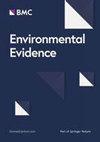通过证据综合加强环境政策:对 "面向未来的环境证据(EEF)倡议 "的审查
IF 5.2
4区 环境科学与生态学
Q2 ENVIRONMENTAL SCIENCES
引用次数: 0
摘要
未来环境证据(EEF)倡议的提出是为了应对英国决定退出欧盟及其相关环境框架所带来的挑战和机遇。自然环境研究理事会 (NERC) 与环境证据合作组织 (CEE) 和英国利益相关者密切合作,制定了该倡议,以确定和解决关键证据缺口,为环境政策和可持续性提供长期愿景。EEF 计划分为三个阶段:战略优先事项的确定、NERC 小组奖项的选择以及现有证据系统地图的绘制。第一阶段包括在英国各地举办合作研讨会,以确定环境科学方面的关键知识差距。随后进行的优先排序产生了 10 个专题领域的 65 项挑战。在第二阶段,NERC 在 CEE 的支持下,开始公开征集研究提案,强调证据综合方法的使用。遴选过程兼顾了课题的重要性和申请者的专业知识,最终为五个项目提供了资金。在最后阶段,根据欧洲环境教育中心的指导方针和标准,绘制了现有证据的系统地图,对特定主题的现有文献进行了结构化概述。EEF 计划展示了英国自然资源研究所(NERC)、独立的非营利组织(CEE)、学术界和政府机构之间的有效合作,通过严格的证据综合方法应对关键的环境挑战。该计划加强了研究界对这些方法的理解和利用。主要经验包括:包容性优先事项设定的重要性、广泛的政策问题与具体的系统地图问题之间的区别、对系统地图价值的认识以及经验在证据综合团队中的作用。当决策者和研究人员在资源有限的环境中制定环境政策时,EEF 计划强调了系统地图绘制和审查过程对于循证决策的成本效益和效率。通过英国国家环境研究中心(NERC)的资助取得成功,为未来以专题证据为重点的计划开创了先例,强调了继续支持研究人员发展综合技能的必要性,并鼓励政府直接委托有针对性和响应性的证据。欧洲环境基金倡议是有效合作的典范,为在不断变化的环境格局中解决证据差距和制定循证决策提供了宝贵的见解。本文章由计算机程序翻译,如有差异,请以英文原文为准。
Enhancing environmental policy through evidence synthesis: a review of the Environmental Evidence for the Future (EEF) Initiative
The Environmental Evidence for the Future (EEF) Initiative emerged in response to the challenges and opportunities presented by the UK’s decision to leave the European Union and its associated Environmental Frameworks. The Natural Environment Research Council (NERC), working closely with the Collaboration for Environmental Evidence (CEE) and UK stakeholders, developed the initiative to identify and address crucial evidence gaps, offering a long-term vision for environmental policy and sustainability. The EEF Initiative progressed through three stages: strategic priority identification, NERC panel award selection, and the production of Systematic Maps of existing evidence. The first stage involved collaborative workshops across the UK to identify key knowledge gaps in environmental science. The subsequent prioritisation resulted in 65 challenges across 10 thematic areas. The second stage saw NERC initiating, with CEE support, an open call for research proposals emphasising the use of evidence synthesis methodology. The selection process, balancing topic importance and applicant expertise, led to funding for five projects. The final stage involved the production of Systematic Maps of existing evidence based on the CEE Guidelines and Standards, providing a structured overview of existing literature on specific topics. The EEF Initiative demonstrated effective collaboration between UKRI (NERC), an independent non-profit (CEE), academia, and government agencies, addressing critical environmental challenges through rigorous evidence synthesis methodologies. The programme enhanced understanding and utilisation of these methodologies within the research community. Key lessons include the importance of inclusive priority-setting, differentiation between broad policy questions and specific Systematic Map questions, recognition of the value of Systematic Maps, and the role of experience in evidence synthesis teams. As policymakers and researchers navigate environmental policies in a resource-constrained environment, the EEF Initiative highlights the cost-effectiveness and efficiency of systematic mapping and review processes for evidence-based decision-making. The success of funding through NERC sets a precedent for future thematic evidence focused programmes, emphasising the need for continued support in developing synthesis skills among researchers and encouraging direct government commissions for targeted and responsive evidence. The EEF Initiative serves as a model for effective collaboration, providing valuable insights into addressing evidence gaps and shaping evidence-based policymaking in an ever-evolving environmental landscape.
求助全文
通过发布文献求助,成功后即可免费获取论文全文。
去求助
来源期刊

Environmental Evidence
Environmental Science-Management, Monitoring, Policy and Law
CiteScore
6.10
自引率
18.20%
发文量
36
审稿时长
17 weeks
期刊介绍:
Environmental Evidence is the journal of the Collaboration for Environmental Evidence (CEE). The Journal facilitates rapid publication of evidence syntheses, in the form of Systematic Reviews and Maps conducted to CEE Guidelines and Standards. We focus on the effectiveness of environmental management interventions and the impact of human activities on the environment. Our scope covers all forms of environmental management and human impacts and therefore spans the natural and social sciences. Subjects include water security, agriculture, food security, forestry, fisheries, natural resource management, biodiversity conservation, climate change, ecosystem services, pollution, invasive species, environment and human wellbeing, sustainable energy use, soil management, environmental legislation, environmental education.
 求助内容:
求助内容: 应助结果提醒方式:
应助结果提醒方式:


